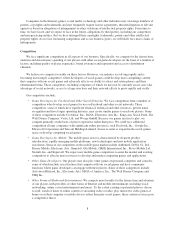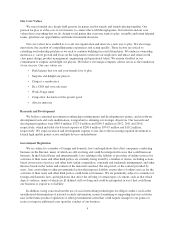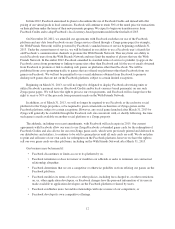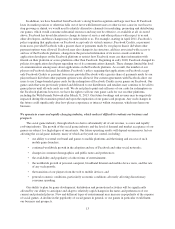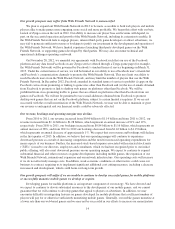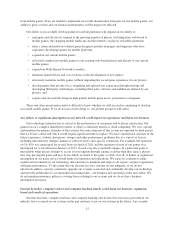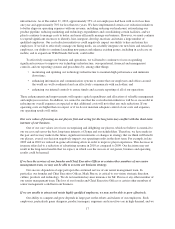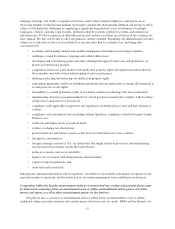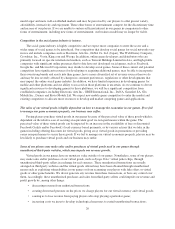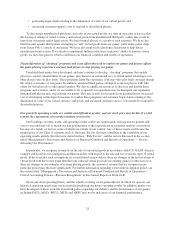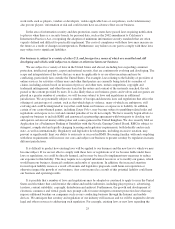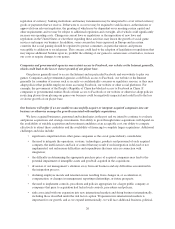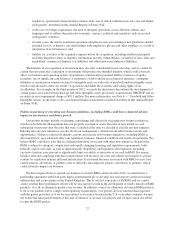Zynga 2012 Annual Report Download - page 26
Download and view the complete annual report
Please find page 26 of the 2012 Zynga annual report below. You can navigate through the pages in the report by either clicking on the pages listed below, or by using the keyword search tool below to find specific information within the annual report.devote significant resources to identifying, recruiting, hiring, training, successfully integrating and retaining these
employees. We have historically hired a number of key personnel through acquisitions, and as competition with
other game companies for attractive target companies with a skilled employee base increases, we may incur
significant expenses in continuing this practice. The loss of talented employees or the inability to hire skilled
employees as replacements could result in significant disruptions to our business, and the integration of
replacement personnel could be time-consuming and expensive and cause additional disruptions to our business.
If we do not succeed in recruiting, retaining, and motivating our key employees to achieve a high level of success
or if we do not attract new key personnel, we may be unable to grow our business or execute our business
strategy and as a result, our revenue and profitability may decline. We believe that two critical components of our
success and our ability to retain our best people are our culture and our competitive compensation practices. As
we continue to develop the infrastructure of a public company, we may find it difficult to maintain our
entrepreneurial, execution-focused culture. In addition, some of our employees may have been motivated to work
for us by an expectation that our Class A common stock would be trading at a higher value and may be less
motivated by the equity compensation they receive as a result. Competitors may leverage any resulting
disappointment as a tool to recruit talented employees. Despite this, many of our employees may still be able to
receive significant proceeds from sales of our equity in the public markets, which may reduce their motivation to
continue to work for us. In addition, there may also be disparities of wealth between those of our employees
whom we hired prior to our initial public offering in December 2011 and those who joined us after we became a
public company, which may harm our culture and relations among employees. We have recently experienced
attrition at higher levels than we have in the past, in part as a result of our transition to a public company. In
addition, we have recently begun implementing certain cost reduction initiatives to better align our operating
expenses with our revenue, including reducing our headcount, and these cost reduction initiatives could
negatively impact our ability to hire and retain key employees.
An increasing number of individuals are utilizing devices other than personal computers to access the
Internet, and versions of our games developed for these devices might not gain widespread adoption, or may
not function as intended.
The number of individuals who access the Internet through devices other than a personal computer, such as
smart phones, tablets, televisions and set-top box devices, has increased dramatically, and we believe this trend is
likely to continue. The generally lower processing speed, power, functionality and memory associated with these
devices make playing our games through such devices more difficult and the versions of our games developed for
these devices may not be compelling to players. In addition, each device manufacturer or platform provider may
establish unique or restrictive terms and conditions for developers on such devices or platforms, and our games
may not work well or be viewable on these devices as a result. To expand our business, we will need to support a
number of alternative devices and technologies. Once developed, we may choose to port or convert a game into
separate versions for alternative devices with different technological requirements. As new devices and new
mobile platforms or updates to platforms are continually being released, we may encounter problems in
developing versions of our games for use on these alternative devices and we may need to devote significant
resources to the creation, support and maintenance of such devices and platforms. If we are unable to
successfully expand the platforms and devices on which our games are available, or if the versions of our games
that we create for alternative platforms and devices are not compelling to our players, our business will suffer.
Expansion into international markets is important for our growth, and as we expand internationally, we will
face additional business, political, regulatory, operational, financial and economic risks, any of which could
increase our costs and hinder our growth.
Continuing to expand our business to attract players in countries other than the United States is a critical
element of our business strategy. An important part of targeting international markets is developing offerings that
are localized and customized for the players in those markets. We have a limited operating history as a company
outside of the United States. We expect to continue to devote significant resources to international expansion
through acquisitions, the establishment of additional offices and development studios, and increasing our foreign
18


